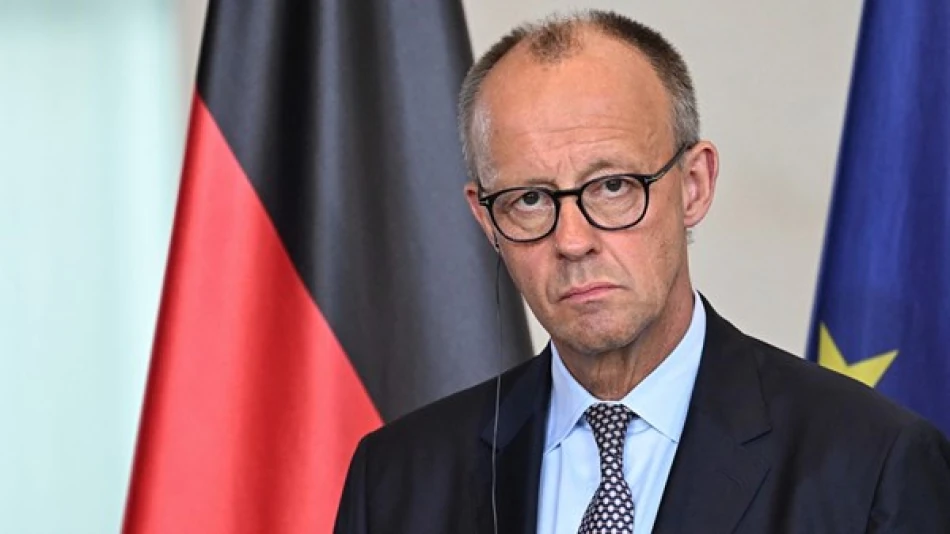
U.S. Offers Security Guarantees for Ukraine, Mertz Confirms
Trump-Putin Alaska Summit Signals Major Shift in Ukraine Peace Strategy
A potential breakthrough in the Ukraine conflict emerged following a surprise summit between Presidents Donald Trump and Vladimir Putin in Alaska, with Germany's Chancellor Friedrich Merz revealing that the United States is now prepared to participate in security guarantees for Ukraine. The development marks a significant departure from previous American reluctance to commit to long-term European security arrangements and could reshape the geopolitical landscape of post-war Ukraine.
US Commits to European Security Architecture
Speaking to German public broadcaster ZDF on Saturday, Chancellor Merz disclosed that Trump had briefed him on the Alaska talks, emphasizing a crucial shift in American policy. "The good news is that the United States is ready to participate in such security guarantees and will not leave the matter to Europeans alone," Merz stated.
This represents a marked evolution from traditional American foreign policy approaches that have historically avoided binding security commitments in European territorial disputes. The willingness to engage directly in Ukraine's security framework suggests Trump views the conflict as requiring sustained American involvement rather than a quick withdrawal strategy.
Three-Way Summit on the Horizon
The diplomatic momentum is building toward a potentially historic three-way meeting between Putin, Trump, and Ukrainian President Volodymyr Zelensky. This follows Zelensky's scheduled Monday meeting with Trump in Washington, which European leaders will help prepare during a Sunday consultation.
Merz indicated that "if this succeeds, it will be more important than just a ceasefire," suggesting negotiations could produce a comprehensive peace framework rather than a temporary halt to hostilities. Such an outcome would represent the most significant diplomatic breakthrough since Russia's February 2022 invasion.
Negotiating from Current Battle Lines
A critical development from the Trump-Putin discussions involves Russia's apparent willingness to negotiate based on current frontline positions rather than demanding recognition of broader territorial claims. This pragmatic approach could provide the foundation for realistic peace talks, as it acknowledges military realities on the ground while potentially preserving Ukrainian sovereignty over contested regions.
This shift mirrors successful conflict resolution models seen in other frozen conflicts, where de facto control becomes the basis for negotiated settlements rather than maximalist territorial demands.
European Role in American-Led Process
Despite Europe's substantial financial and military support for Ukraine throughout the conflict, Merz acknowledged that "the US President has the capability, whether militarily or through appropriate sanctions and tariffs, to push Russia to move more than it currently does."
This assessment reflects the reality that American economic and military leverage remains decisive in pressuring Moscow. The US controls access to critical financial systems, possesses the world's largest military budget, and can impose sanctions with global reach that European measures cannot match.
Market and Strategic Implications
The prospect of a negotiated settlement could significantly impact global markets, particularly energy and defense sectors. European natural gas prices, which have remained elevated since the conflict began, could see substantial volatility as peace prospects emerge. Defense contractors who have benefited from increased military spending may face reassessment as the urgency for weapons production potentially diminishes.
For Ukraine, American security guarantees would provide the credible deterrent necessary to prevent future Russian aggression while potentially opening pathways to NATO membership or alternative security arrangements. This approach resembles successful models used in South Korea and other strategic partnerships where US commitments have maintained long-term stability.
The diplomatic developments suggest that after nearly three years of conflict, the major powers may be converging on a framework that balances Ukrainian sovereignty with Russian security concerns while ensuring American strategic interests in European stability.
Most Viewed News

 Layla Al Mansoori
Layla Al Mansoori






